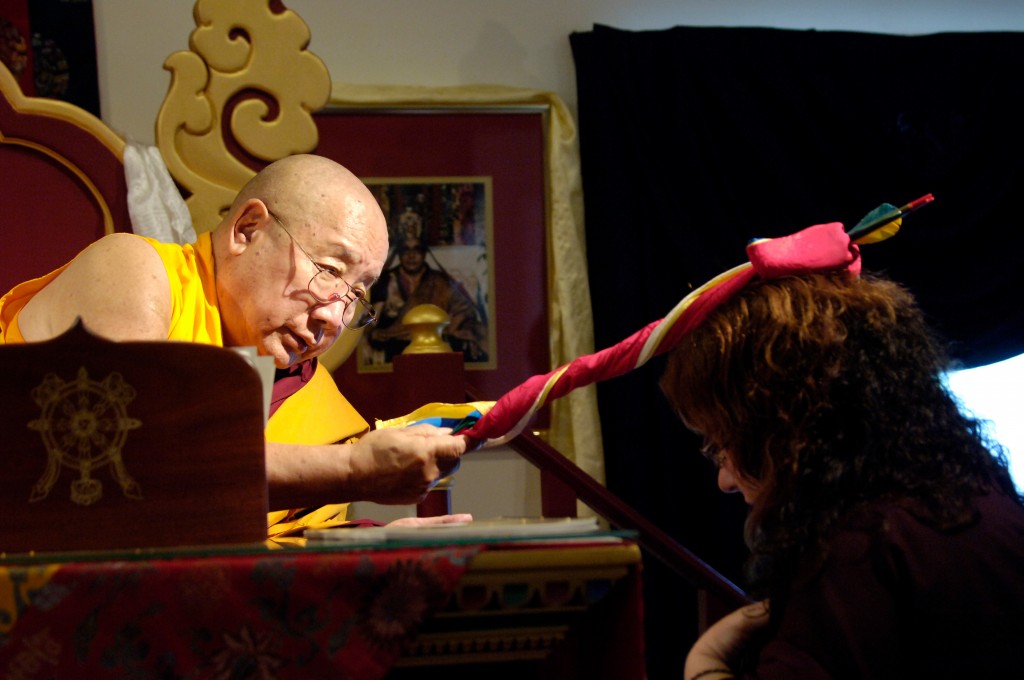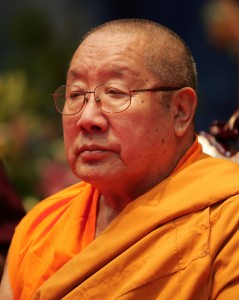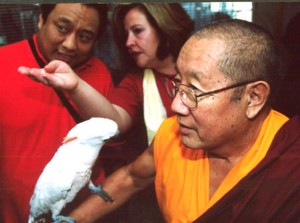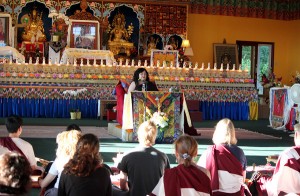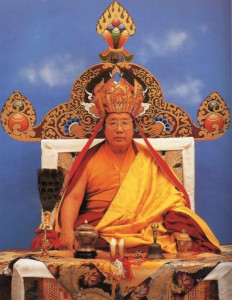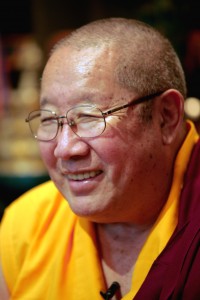The following is a photo of His Holiness Penor Rinpoche offering Empowerment to Jetsunma Ahkon Lhamo:
His Holiness Penor Rinpoche
Love For All Beings
[Adapted from an oral commentary given by His Holiness Penor Rinpoche in conjunction with a ceremony wherein he bestowed the bodhisattva vow upon a gathering of disciples at Namdroling in Bozeman, Montana, November 1999. —Ed.]
Think about all living beings that at some time or another, throughout the course of innumerable past lifetimes, have been your own kind father or mother. Consider how a mother will do anything for her child—even give her own life, without hesitation. Consider how all living beings have been that kind to you at some time in the past—not just once, but countless times, in countless different circumstances and situations over the course of countless lifetimes since beginningless time. Consider also that to not think carefully about repaying kindness, and thereby to go through your life without the intention to truly benefit parent sentient beings, and so to actually ignore them, is truly shameless.
Many people in the West may think, “Wait a minute! My parents were not very kind to me. In fact, we are not even close, and I don’t even like them, so why should I feel that I need to repay their kindness now?” If that is what you think, then take a moment to think about how you acquired your body. Is it not due to the kindness of your parents that you have your precious human body? From the time your consciousness entered the union of your father’s seed and your mother’s egg, your mother carried you in her own body. Her body nurtured you as you grew within it. Then with pain and difficulty she gave birth to you. Her kindness did not just stop there: for many years she cared for you and lovingly fed, cleaned, clothed, and wiped you; she provided shelter and cared for you when you were sick, and then she protected you and looked out for you constantly. If you think you don’t need to repay the kindness of your parents, just remind yourself of those events, which you were the recipient of time and time again.
If that still does not change your attitude, so that you still do not understand the kindness your parents showed you, then think about your body, the gift of your body, which is who you are; your parents gave you that. Because your parents showed you the great kindness of giving you your body, your precious life, here you are. Sure you had the causes for your precious human rebirth, but without parents you wouldn’t have your body. And you didn’t have your body, you wouldn’t be able to receive these vows.
In our present state of ignorance, we have an inability to recognize that all beings have been our parents in the past, and we certainly don’t know what the particular situations and circumstances of those lifetimes were. Nonetheless, it is certain that we have had countless sentient beings as our parents over and over again in countless past lives. The truth is, at the present time we just do not recognize that.
Imagine you are on the bank of a river with your mother and suddenly she falls in and is being carried away by the rushing water. There you stand on the bank, watching that happened. What would you do? Would you do something to try to save her, such as throw out a rope? Or would you turn your back and walk away rather than risk your own life? Would you be concerned for her, or would your concern be only for yourself? The intention of the hearers and solitary realizers can be likened to this latter case, while the intention of the Mahayana practitioners can be likened to the former. While it is important to develop attraction toward peace, you should never for any reason, be attracted to the quiescence of the hearers and solitary realizers.
From “THE PATH of the Bodhisattva: A Collection of the Thirty-Seven Practices of a Bodhisattva and Related Prayers” with a commentary by Kyabje Pema Norbu Rinpoche on the Prayer for Excellent Conduct
Compiled under the direction of Venerable Gyatrul Rinpoche Vimala Publishing 2008
Why We Practice
The following is an excerpt from a teaching by Jetsunma Ahkon Lhamo offered at Palyul Ling Retreat in 2012:
So I think as we ascend to the higher teachings, we have to remember the bodhicitta. We have to remember that if we are not kind, there’s nothing that we are doing that’s useful. If we are not kind, there’s no way we are going to be able to keep our practice going, because we will forget the suffering of sentient beings. And if we do that, we are lost. We forget why we are practicing. We don’t practice. And then if we are lucky, we may see a person whose suffering can be read on their face. You can see that. And if you are fortunate enough to see that, it may remind you that it is time to do your practice.
I promise you, you won’t forget to do your practice for the rest of the year if you meditate on the suffering of sentient beings every day – even just for five minutes. Ten minutes is better. But if we can manage to do that, that’s what keeps us going. Otherwise our practice becomes dry. It’s too intellectual. We reason with our practice, and we kind of argue with our practice. And yet with bodhicitta, it’s impossible to do that. How can bodhicitta be the wrong thing to do? How can bodhicitta be something that you can skip? We must be kind. His Holiness the Dalai Lama and all the high lamas that I have ever heard have always said that you must be kind. That’s what’s happening. So I have pretty much stuck with teaching bodhicitta all my life, and I’ve been doing this for about 30 years.
Bodhicitta is beautiful. It is nourishing. It’s like food. If you keep yourself nourished by practicing the bodhicitta, you’ll continue to be full and have confidence, and be able to benefit sentient beings even though it seems so hard to keep going. We all have jobs. It seems so hard to keep going but if you remember the bodhicitta, and that it is your reason for practicing, you absolutely will not give up. I promise you. That is the answer.
Everyone I’ve talked to has this problem—practicing for part of the year, and keeping that going. Although it’s not true of Tibetans necessarily, it is true of Americans. Tibetans were brought up in a culture that is all about loving-kindness, and the Dharma is part of their entire system. It’s in their blood and it’s in their brains and it’s everywhere. But we Americans like to have reasons for things. The best thing to do is to stop being so prideful and go back to the very reason why you are here. You are not here to wear a fancy robe. You are not here to receive high teachings and walk around so prideful. No, you are here first of all because you love His Holiness; and then you are here because you know that sentient beings suffer and that you can help. I know of nothing that is more precious than that. You can help. We forget that. We think the practice is about us, making advances. We should make advances in our practice. It’s true. We should. And yet we have to remember that the true reason why we practice is love.
Now if there is anything that I’ve said that offends you, I’m sorry, but not really. I will sit here and pound bodhicitta into your heads until I no longer have the opportunity because it is what I believe and what I know will bring benefit to the world. It’s what brought His Holiness to us. It is what will bring him back.
If we keep our promises and benefit sentient beings, he will return to us. Maybe he already has. Who knows? But it is our job to call him with our hearts by practicing in the way that he taught us.
Copyright © Jetsunma Ahkon Norbu Lhamo All rights reserved
Kindness is the Way
The following is an excerpt from a teaching by Jetsunma Ahkon Lhamo offered at Palyul Ling Retreat 2012:
His Holiness Penor Rinpoche was one of the most stubborn lamas in the beginning. He did not want to teach Dzogchen yet, because he didn’t want to throw Dharma on the floor. Instead he wanted everybody to learn the great bodhicitta, and he made you understand that there is no power anywhere stronger than the bodhicitta.
When Tibetan kids are young, their moms or their Amas, their nannies, or whoever takes care of them, teaches them about kindness. It’s customary. It’s what happens. That doesn’t happen here in America. It’s so fortunate that Tibetan Amas and mommies teach their children that way from birth.
I think in some ways we should think of our own mothers who have taught us like that to be like a root guru to us. The first one that taught you to be kind, that’s a root guru. The first one that taught you to love, that’s a root guru. The first one that taught you that bodhicitta is the most important power in the universe, that’s a root guru. His Holiness taught me that, and he is my root guru.
I wish the fashion would turn around, and that there would be more teachings given out constantly about bodhicitta. I wish we would not set it aside. I wish Tibetan lamas would not listen to us, because we are so prideful and so willing to think that we know what’s best. His Holiness was one of the last ones that gave in and began to teach some Dzogchen. I think he felt the way I do—that bodhicitta is the most important thing. Once when he saw the dogs and the parrots that we were saving, he said, “That’s Dharma. That’s Dharma.” That’s what His Holiness said, and I believe it. I know it to be true. Kindness is the way.
. . . Sometimes we can be so prideful. We think that having practiced so well it is not necessary for us to be kind. We can concentrate on the academic part, the intellectual part, and then we will have it all down perfectly. But that is not really the truth. Academics is part of the teaching. Meditation is part of the teaching. Taking vows, that’s part of it. Please don’t forget, most important is the great bodhicitta. It is the very display of all that is light and pure. It is the very display of goodness. We like to forget it and let it go, but please don’t. I beg of you. Don’t do that.
Your mind will stay fresh and sweet if you are always concerned for sentient beings. And we must always be concerned for sentient beings because they don’t know how to take care of themselves. They don’t know how to do what is necessary to accomplish any Dharma or anything really meaningful in their lives. Many people get a scholarship and they go to college and then that’s it. They’ve done it. But it’s not true. It is most important to develop kindness. It is most important to be kind.
For those of you who are unforgiving in your demeanor and not so kind, you don’t give Buddhism a good image. That should be what it is all about to you. I will assume that probably isn’t pleasant to hear, but it is what I believe and what I know. If you did nothing else but take the bodhisattva vow and spend the rest of your life praying and benefitting sentient beings, you will have accomplished a lot. When you go back home, whether it is New York City or Kalamazoo or wherever it is, bring this little bit of information with you.
. Look around. Stop closing your eyes. Are you going out to dinner this evening? Then notice the person sitting on the street with nothing to eat. Maybe bring them what’s left or give them some money for some food. If you are going to the movies, think about it twice. Go to the movie but then take the same amount of money and give it to someone who really needs it. I believe in that. It is called paying it forward. And it is the best display that you can possibly give people about what the Dharma is. If you display your activity like that, they will understand. They will understand what Dharma is. But if we are self-important, prideful and in love with ourselves, we will never see the beauty of Dharma. Never. We must see this. We must understand that Dharma is not different from loving-kindness, and it is not different from our nature.
Copyright © Jetsunma Ahkon Norbu Lhamo All rights reserved
Go Back to Bodhicitta
The following is an excerpt from a teaching given by Jetsunma Ahkon Lhamo at Palyul Ling Retreat in New York 2012:
In the beginning, all the lamas, including His Holiness Penor Rinpoche, ever taught us about was the bodhicitta. All we ever got was the bodhicitta. People would ask for Dzogchen. Give us Dzogchen. And the lamas would say, “No, you’re not ready. You’re not ready. Let’s start with the bodhicitta.” After awhile, Americans got really sick of the bodhicitta. It’s really sad, but they did. I never did. In fact, I never stopped teaching bodhicitta. I know that now the bodhicitta is kind of reduced to a small bit of speech or teaching that comes right at the beginning of a practice or a wang or teaching. It is very condensed compared to what it used to be. When the lamas first came to America, it was just bodhicitta, and really nothing else. But the American students were insistent that they were ready for the Dzogchen. Eventually the lamas gave in. And I am sorry that happened, because I think we missed something.
I notice that when some practitioners practice, they’re calm and that’s good, but they are also solemn. They are not so happy looking, not so joyous. Dharma is joyous. To be able to practice Dharma is a feast. There’s nothing in the world more joyous than that, because you have something—. \you have Buddha in the palm of your hand. You have something that nobody else has here in America. Other people have other teachers. And they have other lineages and that’s great, but we have this. And we should be thrilled and happy, and try to maintain the understanding of how precious this is.
The day we decide that we are too advanced for bodhicitta is the day that we’ve lost our way. Because if all we ever studied from this point on was the bodhicitta, it would be enough. Sometimes when we go into the higher teachings, we forget what the root is. Bodhicitta is the root. Bodhicitta is the root of everything that comes after. If you cannot develop the bodhicitta, it will be very difficult to stay on the path. As they say, the bodhicitta is like the dakini’s warm breath. It is what we consider to be the activity of the Buddhas, the nature of the Buddhas, like the sun’s rays—part of the sun and yet coming out to bless all. So when we think about the bodhicitta and we think that maybe it’s an early practice, and maybe we are being insulted by being taught this practice or maybe we should be allowed to go on, don’t hurry.
If I had my choice, I would teach nothing but bodhicitta. I used to do that, almost like Baskin Robbins’s 51 flavors of ice cream. I used to think about 51 different ways, as many ways as I could, to teach bodhicitta. I would get really creative so that it wouldn’t be boring. And what I found is that most people didn’t notice that they were only being taught the bodhicitta, because I would teach it in such a way that it would seem different and interesting. And I would make people laugh, and that always helped. You can’t be stiff when you are laughing. I made it joyful. All of us felt great joy to be together, as I see you do too. I think it is the most beautiful part of the Dharma. If we say that it is the smallest part, or the least of the parts, it is a mistake. Do all of you understand that? It is a mistake if we put bodhicitta lower than anything else, because in order to practice we need the bodhicitta desperately. It is what keeps us going. It is nourishment.
My philosophy is that if we are on the path and every year we practice really hard and really purely here and then go home, but then forget about it, as so many of us do, then in my experience we need to go back to the bodhicitta and study the suffering of sentient beings again, again and again. Study the suffering of sentient beings so that you can understand why it is that you are practicing. You’ll have strength to practice because you will see them, and they are suffering terribly.
Seeing that woman and her husband on the roof was for me a great motivator. It was a great strengthener. It gave me spiritual muscle so that whatever I did, bodhicitta was always the crown on the head of my practice. And then above that, of course, is Tsawai Lama—above the crown of my head, and in my heart, as I know he is in yours.
Copyright © Jetsunma Ahkon Lhamo. All rights reserved
Guru Yoga Lineage Prayers Recited by HH Penor Rinpoche mp3
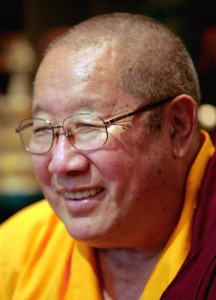 The following is respectfully posted from “Guru Yoga” by Intrinsic Sky Sound System: 08 Guru Yoga (Lineage Prayers)Small
The following is respectfully posted from “Guru Yoga” by Intrinsic Sky Sound System: 08 Guru Yoga (Lineage Prayers)Small
Why I Chose Buddhism
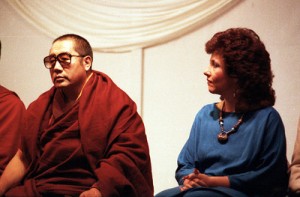
An excerpt from a teaching by Jetsunma Ahkön Lhamo
I never cease being surprised when someone is personally challenged by my path, especially since I never try to convert them. I don’t understand why it should bother one person what religion another person practices. Or how one person can take it as a personal threat when someone else doesn’t believe in their god. I cannot for the life of me see where unity argues with diversity. In fact, I think that a lot of the world’s problems, at least from the relative point of view, arise because people have no tolerance for one another.
Since I have listened to many people describe to me their heartfelt feelings about what it was like for them when I chose Buddhism, I would now like to tell you how it was for me when I chose Buddhism. I think turnabout is fair play.
First of all, from my perception, there was never any conversion process. There was never a time when I converted from something else to Buddhism. The reason why is that since the time of my adulthood, I have never formally identified with any religion. There was never a time that I felt that I was going to an external god; and yet I have a very spiritual and religious sense of there being a goal, a path and a reality that is absolute or true. And I knew that that reality had no describable nature, that that reality was essentially free of all conceptualization, that that reality wasn’t a reality in a sense, because reality implies thingness. I knew that there was something that was beyond; and that beyondness was free of any ideas of here or there, or high or low, or self or other. It was free of any contrivance
I didn’t use the word emptiness at first because I didn’t know the word, but I used to think of it as being vibrationally zero. That is to say, there was no artificial construction within it, no contrivance, no conceptualization. I knew that any conceptualization or idea that one had was delusion. And I knew that there was an awakened state in which one realized one’s nature, and that nature was essentially free of all limitation. That nature is not separate, it is not other; it is not something that one must go to or even progress toward. That nature is the true nature, and one needs to awaken to it, and that awakening occurs naturally.
In order to describe that philosophy, at first I had to use general metaphysical terms. There were no other terms for me. I never had anything to do with Buddhism. I had never even read a book about Buddhism. When I met His Holiness Penor Rinpoche and I began to hear about the Buddha’s teachings, my sense was not of changing at all. Nothing of the Buddha’s teaching seemed strange to me. From the deepest part of my heart, I felt that I had come home. My sense was, “At last, here’s the vocabulary I’ve been looking for. Here are the words that I’ve needed all this time to describe what I’ve been trying to teach.” And so gradually I began to absorb and introduce the vocabulary into my teaching, because I already had students at that time.
Now Penor Rinpoche says that I’m an incarnation of somebody that used to be Tibetan 400 years ago. I don’t really know if that’s true or not. If Penor Rinpoche says what he says, then that is due to his wisdom and his kindness, and I can’t take any credit for that; and I have nothing to do with it, other than that I rely on it. I feel like I am just an ordinary person and I’m doing my best. I believe in the Buddha’s teaching. I believe that compassion will save the world. I believe that enlightenment is the end of suffering. That’s what I know.
So I’m not going to pull an ego trip and say, “Oh, when I heard the Buddha’s teaching, I recognized it, I knew it, I remembered it,” in some hokey way. I’m not going to say to you, “Oh, immediately upon hearing the Buddha’s teaching I came into my own, and therefore I knew all these amazing things.” It wasn’t like that at all. It was something like the joy you might feel if you recognized music that had been in your heart for a long time being played on the radio. There was a part of me that could recognize this truth as being truth. It wasn’t really a change. It was more like finding the right suit of clothing for my size. So if any of you are uncomfortable with the fact that I’ve changed, please don’t be; I’m certainly not. I’ve always been a Buddhist. I just didn’t have the words.
Now, I would like to tell you a little bit about what I felt in my heart when I found the Buddha’s teaching. I felt humbled to have the opportunity to practice a path that has been around for more that two and a half millennia and that has brought people to enlightenment again and again and again. Ordinary sentient beings, through the intensity of their devotion and their practice, have achieved not theoretical, but exacting, reportable and repeatable physical and psychic signs that indicate enlightenment, such as bodies producing relics at the time of death and other miraculous signs. This has happened again and again and again to guys like you and me.
Sometimes I stop and I think, “What can I have possibly done to have this opportunity? What good fortune has befallen me? What circumstances have come together over ages and ages of time to give me this chance to practice a path that really works and has worked again and again and again?”
I am awestruck that I don’t have to follow someone’s advice who is not enlightened, because I am following the Buddha’s teaching. The Buddha knows what he’s talking about because it brought him to the state of supreme realization, and it has produced enlightenment in so many beings.
© Jetsunma Ahkön Lhamo
28th Anniversary of the Enthronement of Jetsunma Ahkon Lhamo
The lowing of the conch shell sounded from various points on the temple grounds like a soft foghorn. It overlaid the patter of hammers as stupa construction continued. Sometimes the sound wavered and spluttered out, and Jetsunma would laugh, lowering the conch. She was practicing for the enthronement ceremony the following day and had been told at the last minute that she would have to blow the conch. She never had before, at least not in this lifetime. She wiped her mouth and joked to her students, “I’m never going to get this down.”
She gamely tried again, continuing her gradual circumambulation of the temple. The sound came out clear and strong and hung in the air. After a moment of stillness, the students cheered.
On September 24, 1988, the temple filled with cameras and mics angled in every direction. Jetsunma sat quietly humble on the throne, and straightened the brocades draped over her shoulders, blinking at the lights. The temple had never been so brightly lit. To the blare of Tibetan horns and ringing bells, NBC filmed while His Holiness Penor Rinpoche, Throne Holder to the Palyul Lineage of the Nyingma School of Vajrayana Buddhism, formally enthroned Jetsunma Ahkon Lhamo as a tulku, or reincarnate teacher.
According to tradition, ceremonial items were carried from H.H. Penor Rinpoche to Jetsunma, empowering her to teach and formally represent the Palyul Lineage. When the time came for her to blow the conch on camera, the sound came clear and then wavered. Not as good as the night before. She shared a wry smile with her students, tipping her head, Oh well. Then one of the monks had to blow the conch. His Holiness chuckled and Gyaltrul Rinpoche translated his comment, “They should have had Jetsunma do it.”
The news spread via Associated Press, and world newspapers printed photos of the spectacle of a western woman with long dark hair on a Tibetan throne. Her enthronement came at a time when Vajrayana Buddhism was relatively unknown in the US. The year before, an obscure Tibetan monk, H.H. the Dalai Lama, spoke at the National Cathedral to a scattered audience of about a hundred. At Buddhist temples in the late 1980s, teachers were universally Asian.
It was openly questioned whether westerners could accomplish this eastern religion.
H.H. Penor Rinpoche, who never shirked what was needed, answered with a resounding yes. As he enthroned her, he said, “People have asked me why there are no American tulkus. And people have asked me why there are no female Lamas. Now you have both. So you should be very happy.”
“This is for you,” Jetsunma said later to her students. “It’s for all of us really. This is your own enthronement, your own future accomplishment that you’re seeing.” She explained that the enthronement meant that not only can Dharma be accomplished, it can be accomplished by westerners, even in this day and age. “Yes, even you.” And she wrinkled her nose impishly at her students, and laughed.
Post written by Michelle Grissom
The Seven Branch Offering: Commentary by His Holiness Penor Rinpoche
The Seven Branch Offering
The following commentary was extracted from a teaching given by His Holiness Penor Rinpoche at Kunzang Palyul Choling in 2001 on the occasion of offering the Bodhisattva Vow. To see the verses of the ceremony for the Bodhisattva Vow to which His Holiness was referring you can click here.
From Words of My Perfect Teacher:
The Vajrayana path includes many methods and is without great hardships. It is intended for those with sharp faculties. If we constantly train ourselves to accumulate merit and wisdom with a strong mind, everything that would otherwise take a whole great kalpa to accumulate through the six paramitas can be accomplished in an instant, and liberation can be attained in a single lifetime.
There can be no doubt that the single most excellent, secret and insurpassable field of merit is the vajra master. This is why the practice of accumulating merit is combined with the Guru Yoga. The seven parts of the Offering of the Seven Branches include all the innumerable methods for accumulation of merit and wisdom.
Prostrations:
The branch of prostrations is a remedy for arrogance. Sometimes we have arrogance; we feel we are more qualified then the masters and teachers. So, this is a remedy to remove the arrogance.
Offering:
After the prostrations to the Buddhas, bodhisattvas and all disciples, you now have to make offerings to them.. Imagine all the things in the universe as an offering, which is a very good offering. All the offerings will be the sacred flowers and the sacred garlands and musical instruments, perfumes, superior parasols, superior butter lamps, superior incense. All these things will be the offering. Just imagine you are offering them. So, this is the offering. This is the remedy for attachment to our belongings.
Confession:
Now comes purification of negative actions. We have to purify the negative actions by thinking negative actions are like poisons that are inside your stomach. Also, you make a commitment that you will not do those mistakes or bad negative actions again. Also, you think that in order to purify all the negative actions that are in this world that are done by other sentient beings, I am doing these purification prayers. This is the remedy for removing anger.
Rejoicing:
We have to rejoice in the accumulations of merits done by other beings. This is the antidote for jealousy. Sometimes we feel jealous of other beings that practice. In order to remove the jealousy, we have to rejoice in whatever practice they are doing. This is the remedy for that action.
Requesting Enlightened Beings to Teach:
The next stanza is requesting the enlightened beings to teach. We request them to teach because sometimes when they come here for the purpose of teachings, they feel kind of upset when they find the bad reactions of the people. So they feel upset and don’t want to teach. So we have to request them to teach. That is how we are requesting it.
This is the remedy for ignorance, thinking the teaching is nothing, thinking the teaching will not have any result. This chanting will remove the ignorance.
Enlightenment depends on the understanding of the teachings. Without teachings, there is no way of getting enlightened. But some people, those who don’t know, who aren’t in favor of the teachings, then they don’t really see the teaching as worthwhile. They criticize the teachings and those who do the teaching.
Requesting Enlightened Beings to Remain:
The reason why enlightened beings pass away is that they want to show human beings that enlightened beings are very real and they don’t last long if we are not very careful. So, we have to request them to remain as long as possible to turn the Wheel of the Dharma. This is the request to remain with a long life.
This is the remedy of wrong view of Buddhas. Some people think the Buddha is nothing, just a liar. So, they have a lot of wrong views of Buddhas. This way of chanting will remove the wrong view of Buddha.
Dedication:
The last one is a short form of all the seven branches of practice. It’s an offering. This is the dedication of the merit that you have accumulated. You have to dedicate all the merit accumulated by other beings to other beings. In order to get enlightened you have to dedicate the merit.
This is the remedy for doubt. Sometimes we have doubt whether it is true or not. This way of chanting will remove or clarify our doubt.
Understanding the Nightmare – by His Holiness Penor Rinpoche
The following is an excerpt from a teaching by His Holiness Penor Rinpoche on “Meditation” reprinted with permission from Palyul Ling International:
And there are many, many beings that don’t know much about Buddha or Enlightenment or the Dharma teachings or liberation. They really don’t have any idea of such things. Even with all the explanations we could find in these Dharma teachings, and even though so many lamas and other qualified teachers give these teachings, still one might think that these teachings are just myths. And so you can’t truly accept them or believe in the absolute reality.
Everything is based on what is called the Law of Karma which is the actions that we do, the causes and conditions we create ourselves. Furthermore there is a Law of Karma which is known as the Collective Karma, the actions, causes and conditions we create together. There is no way we can change ourselves other than understanding Karma. Moreover, when one cannot understand all these deeper things, then one thinks that these things do not really exist.
When the lamas and the many other qualified teachers¹ teach on the sufferings of Samsara, of course it is not really nice to hear and then one feels like, “I don´t want to hear these kinds of teachings.” Certain people when lama gives these teachings on suffering even say, “I’m not interested to listen about the sufferings of Samsara. This lama doesn’t seem like he can give out good teachings!” These people prefer to just express their own ideas.
However, when taught by a qualified lama, it is indeed the Dharma, the truth. These teachings about the nature of Samsara and the reality of the faults of Samsara have been taught by all the Enlightened Beings such as Shakyamuni Buddha. The Enlightened Beings, the Buddhas, all gave these teachings because if we could just understand the nature of Samsara, we could then move on to the actual practices through which we could purify our obscurations. We could have the ultimate realization through which we achieve peace and happiness, and through that we could manifest ourselves to benefit all other sentient beings in Samsara. For that purpose Buddha gave all these teachings. It is not that Buddha wanted to be famous and so gave these teachings, nor was the Buddha showing off his skills in teaching, nor was he explaining things to us so that we would become frightened. These teachings are mainly about how all sentient beings can believe and act to attain complete Enlightenment, to liberate themselves from the sufferings of Samsara. So you see, Buddha gave these teachings with great compassion.
Take the example of a having a nightmare. Within such dreams, no matter what you do, you still cannot escape the scary feeling of a nightmare until you wake up. At the same moment, someone who is awake and watching beside the bed, can see that you are having a dream. We can understand something of the nature of Samsara from this dream example. While we are in Samsara experiencing all different kinds of sufferings, it is exactly like somebody who is having a nightmare.
